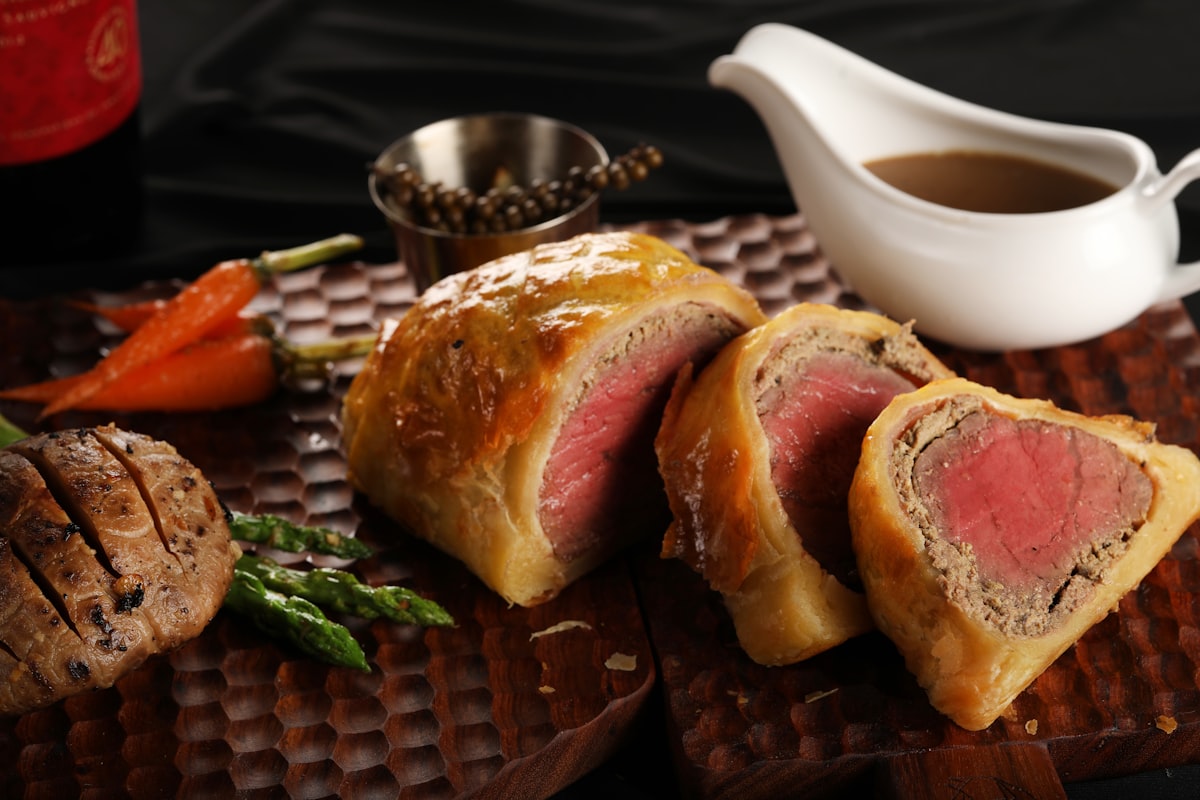The failed recognition of British food
Why does British food have such a bad reputation?

As a British child growing up in France, many of my interactions with the food from my home country came from my parents' delicious home-cooking all the while having to listen to my French friends tell me how badly we ate. They listed food combinations I'd never heard of alongside anecdotal evidence of terrible meals eaten on school trips to the UK as examples of this terrible reputation.
I became incredibly frustrated at this misrepresentation of the food that was so comforting to me. This was slightly exacerbated by seeing Marmite slathered on cold bread with no butter being used as evidence to reinforce this belief, even though it is equivalent to taking a shot of soy sauce and telling East Asians how terrible it tastes.
From my experience, I couldn't find a rational explanation for this slander on the food so dear to me. I was lucky enough to grow up in a household where homecooked meals were important. I also grew up watching celebrity chefs like Gordon Ramsay, Rick Stein and Jamie Oliver talk passionately about food. So this begs the question: why does British food have such a bad reputation?
Like all cultures, the food eaten by the British is an amalgamation of their history and geography. As an island, fish is an incredibly abundant food source, with the Viking invasions of the 8th-9th century bringing preservation techniques like smoking, to which we owe Arbroath Smokies today. Following the Norman conquest, pork and chicken is said to have increased in popularity. The cool and often wet climate favours the growth of grass, which leads to a large beef and lamb production, along with many different vegetables, such as carrots, turnips, cabbage and more.
The quality of the ingredients produced isn't bad either, with Black Angus beef, Stilton and Cheddar cheese, salt marsh lamb, Scottish salmon and all kinds of berries being widely appreciated in Europe and around the world.
Nevertheless, the esteem any cuisine has isn't immune to time. Back in the 18th century, when British cooking settled into what we know it to be today, Grand Tourists travelling around Europe, more specifically Italy, used to mock the food they found there. This seems absurd when looking at it through a modern lens, as Italian food is among the most highly rated in the world. This goes to show how fast a reputation can rise and fall. And Britain's food was to fall victim to this.
One theory dates this reputation drop back to World War II when rationing was imposed on the British population in order to survive the food shortages that occurred. This led to a shift in the perception of food, where it became about survival rather than enjoyment. This can be understood, as the food distributed to the British was low quality canned and powered versions of beloved ingredients. However, Britain wasn't the only country to suffer through the war. Italy, whose population went through the same hardships of rationing, hasn't seen its culinary traditions suffer the same fate.
One of the most famous Italian pasta dishes, pasta alla carbonara, is said to have originated from the rations given to post-war Romans by the Allies. Bacon and powdered eggs were among the ingredients distributed, so adding pasta made a complete meal. Maybe other countries like Italy were just better at creating good food out of nothing. Yet this romantic angle ignores the reality that most countries suffering through rationing didn't eat very well, regardless of where their renown is today.
I'd argue that one of the main reasons for Britain's culinary reputation declining is that British people don't have the same relationship with food as their European neighbours. Lunch breaks in France are at least an hour-long, sometimes even two. Italians can talk about the ingredients of a dish for longer than the dish takes to make.
One way to see this is to take one look at some of the staples of the British diet. Sandwiches, pasties, pies, crisps are all foods you can eat on the go and relatively fast. However, don't conflate fast eating with bad food.
While it is true that it is easy to find industrially made versions of many of these handheld foods, when made properly, they can still be delicious. To this day, I haven't been able to find sandwiches as satisfying as those made with sliced English bread filled with cheese and onion or bacon and chicken. Pork pies remain to this day one of my favourite snacks and are, in my opinion, just a better version of the French pâté en croûte.
Another hypothesis for how our relationship with food differs from that of other countries stems from the repressed nature of British people. Making food and sharing it with others is closely tied to loving and caring, something that isn't as present in British culture as other countries with respected culinary arts.
To people visiting Britain from these countries, it can seem strange that food doesn't play as important a role in everyday conversations. Arguments over whose mother makes the best Shepherd's Pie aren't as common as heated food discussions in Mediterranean countries.
An additional critique of British dishes is their appearance. Whether it's the pasties and pies, the stews and meats, there is a common colour that permeates the food: beige. Colourful contrasts found in foods like tacos or Indian thali aren't as present and can contribute to the lack of enthusiasm when it comes to trying British meals.
Visual appearance, historical and cultural context clearly filter the way in which we look at food. That being said, food should also be judged on its own merit. Good food is simply good food, regardless of external factors.
It is also necessary to look at how modern chefs and restaurants are maintaining and innovating the British table. Take the late Gary Rhodes, often credited for revitalising British cuisine, who took his French training and used it to reinvent classic dishes like oxtail stew and bread and butter pudding. Restaurants like St John, spearheaded by Fergus Henderson, is known for serving off-cuts like sweetbreads, beef heart and bone marrow, an anti-waste mentality that is often admired in other countries. It is also impossible to talk about where the food of Britain is today without mentioning The Fat Duck, named the best restaurant in the world in 2005, where Heston Blumenthal puts a molecular gastronomy twist on many dishes.
Although one of the best ways to experience true British cooking is at a pub, on a Sunday afternoon with a pint of beer, there is a better way to do it. Like many cultures around the world, the best way to experience its food will always be at people's homes. Most people who have lived in Britain will have been to at least once the Sunday Roast. It is generally a family gathering where cooking for loved ones and eating together is a priority.
Generally a simple meal consisting of roast meat, typically beef, chicken or lamb, and vegetables, with gravy drizzled over everything. Yorkshire puddings are commonly served alongside and are the perfect recipient for the gravy. This meal may not look like much to people outside of Britain, roast meats not being unique to the island, but it's a sacred moment that many families wouldn't miss for the world.
Having a conversation about British food today is however impossible without mentioning Indian cuisine. Many ingredients like pepper, cumin, cinnamon and coriander were popularised amongst the British population as a result of the spice trade by the East India Company and the later colonisation of India (1857-1947). Following this, and immigration in the 1950s, their food became popular throughout Britain, with Indian restaurants being numbered at around 10,000 across the country today.
Even though the Indian dishes found across the UK are mainly from the Punjab region of India and therefore don't offer the most diverse representation of their cuisine, the impact they have is undeniable. Chicken Tikka Masala, a marinated chicken dish cooked in a creamy and spicy sauce, was named a British national dish in the early 2000s. As Madhur Jaffrey put in the Indian themed Ugly Delicious episode:
Britain colonised us, we hated that. But now we have colonised them with our food so we paid them back.
One of my favourite food memories in the UK was when I was in Camden Market a few years ago, in the area filled with food stalls. You could find everything there like pastrami on rye, fish and chips, dal makhani and pizza. It showed me that today, British food is a mixture of many different cultures, just like its people. The atmosphere and love for food that I saw in the north west of London is one which any food lover can relate to, and I encourage anyone who is dubious about how British people view food to take a trip there. Granted it is in London, the biggest city in the country and the most obvious place to find enthusiasm for food, but believe me, it is present everywhere. You just need to know where to look.
